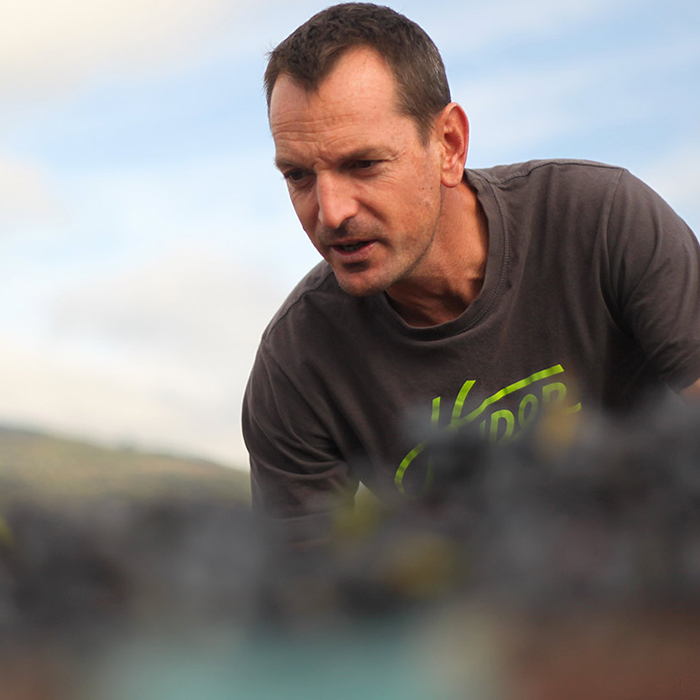Full of soul: Julien Sunier
Author: Will Heslop

Julien Sunier’s wines are characterised by crisp acidity and a cooling mineral component, even in warmer vintages like 2018. They boast a shifting spectrum of aromas that seem to flicker and burst from the glass like the flames of a wildfire. They’re sensual and gouleyant, yet cerebral, with the capacity to express in uncanny detail the unique terroirs that give rise to them.
As the riders found on Stage Eight of this year’s Tour de France, the slopes here in the Beaujolais Crus – which appear so bucolic from a distance – can be vertiginous close-up. Tough for cycling, but harder still for viticulture: drive a pickaxe into the sandy surface of any of Julien’s vineyards in Fleurie, Régnié or Morgon, and it quickly meets the rock (primarily pink granite) just beneath. Making wine here truly is a labour of love.
Raised in Dijon in a non-winemaking family, Julien’s interest in wine was fostered by Christophe Roumier, a friend of his parents. Having completed a degree in viticulture and oenology in Beaune, Julien embarked on a seven-year odyssey. He travelled the world, surfing at every opportunity (he remains an avid surfer) and gaining work experience at wineries in France and abroad. His CV includes harvests at Bonny Doon (Santa Cruz) and Isabel Estate (Marlborough), as well as an internship with Jasper Morris MW, in Jasper’s days running Morris & Verdin.
Julien settled in Beaujolais in 2003 to work for Mommessin, one the region’s largest négociants. He established his own domaine four years later, sacrificing his apartment to buy two hectares of vines in Fleurie (and a campervan in which he slept for several months). Julien’s mentor at the time – as he is to this day – was Jean-Louis Dutraive, of Domaine de la Grand’Cour. Dutraive is among the small group of winemakers credited with kickstarting Beaujolais’s rehabilitation in the 1990s, when the region’s reputation was at its lowest ebb.
From the outset, Julien shared Dutraive’s commitment to organic viticulture and a hands-off approach in the winery. All Julien’s wines are made by carbonic maceration in vats of concrete or stainless steel; they’re then matured in a variety of vessels, including used Burgundy barrels, foudres and – in the case of his 2018 Régnié – concrete eggs.
Though it’s a term Julien accepts with some reluctance, his are natural wines. He eschews artificial yeast, adds little or no SO2, and rarely fines or filters. Crucially, however, Julien’s meticulousness in the winery means they’re clean and stable, with the potential to age gracefully. His Fleurie and Régnié are seductive from the word go, but benefit from an extra year or two in bottle. Wild Soul, meanwhile – a Beaujolais-Villages made from organic grapes grown by a friend of Julien’s in Lantignié – was conceived for immediate drinking; lightly chilled, ideally with charcuterie, pork terrine or perhaps a quiche Lorraine.
Appropriately for a surfer, today Julien is at the crest of a wave of winemakers redefining how Beaujolais is perceived. A darling of the natural wine movement, a mentor to a merry band of like-minded young winemakers, he is in every respect a standard-bearer for this most magical of wine regions.
Explore Julien Sunier’s wines, or our full range of Beaujolais, on bbr.com


